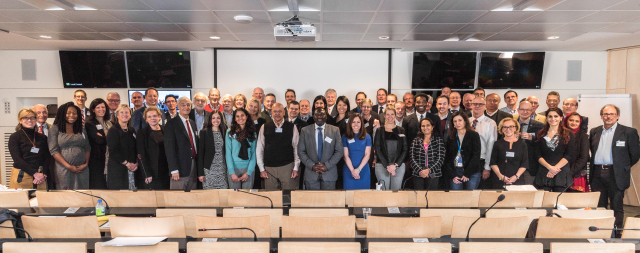On 7-8 November 2016, CERN hosted a workshop on the Design Characteristics of a Novel Linear Accelerator for Challenging Environments. At this event, 70 experts in various fields relating to radiotherapy for cancer treatment met to define a strategy for increasing access to radiotherapy worldwide, in particular in countries that lack resources and expertise. The key topics of discussion were the technology to be deployed in such challenging environments, the maintenance and sustainability of treatment centres, and the training of professional staff.
The workshop was organised by Norman Coleman and David Pistenmaa of the International Cancer Experts Corps (ICEC) in collaboration with Manjit Dosanjh of CERN.
The first essential step to be accomplished was the design of a linear accelerator and the associated instrumentation for radiotherapy that can be operated in places where general infrastructures are poor or lacking, where power outages and water supply fluctuations may occur, and where climatic conditions might be harsh. The ideal facility would have a modular structure, so that it can be easily shipped, assembled in situ, upgraded and repaired. The equipment would also need to have an intuitive and simple interface, similar to that of a smartphone, but be highly technologically advanced below the surface.
A critical issue that was also discussed was the sustainability of the treatment system after its installation. Technical staff would be required to maintain the equipment and repair it promptly if needed, relying on the availability of standard spare parts and quick and easy replacement. The centres could follow the philosophy of a space station, where astronauts have spare components available and can easily replace faulty parts like pieces of Lego, with remote guidance.
Training for capacity building is also a key factor in making such ambitious projects possible. ICEC’s strategy consists of setting up a team of mentors to guide local groups throughout the various phases of the programme. Each centre located in a region with insufficient resources that is aiming to implement radiotherapy would be affiliated with a centre in a resource-rich country and eventually become a reference point for other local groups willing to follow a similar path.
Oncology, radiotherapy and radiobiology professionals, as well as medical physicists, nurses and ancillary staff, would need to be identified in order to ensure assistance in remote locations. After completing regular academic training, the personnel of the remote centre would be mentored and trained by ICEC’s experts through face-to-face lectures, periodic on-site visits and consultations via videoconference. At a later stage, they in turn would be able to train future staff.
During two intense days of debate and exchange of ideas, the participants defined the needs, limits and priorities more clearly. As a follow up, working groups will be established to address different aspects of the problem and the date for another global meeting will be set. In addition, the report emerging from the workshop will be published in various media and journals to catalyse further collaboration.

